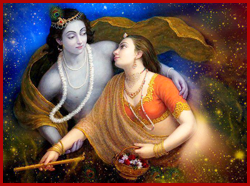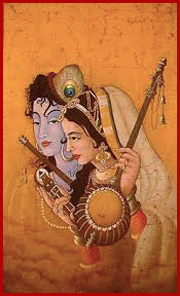Mira Prabhu's Blog, page 86
July 18, 2014
The Author Hot Seat with Mira Prabhu
The Author Hot Seat with Mira Prabhu!
Via Jane Dougherty, who delights her own readers by writing about fantastical places and other stuff…
 Originally posted on Jane Dougherty Writes:
Originally posted on Jane Dougherty Writes:
My third guest author this week is Mira Prabhu whose writing is as vibrant and colourful as her subject matter, the glittering mythology of the Indian subcontinent.
J: Tell us what the story/your work is about, the setting, the background, and where it takes the reader.
M: Whip the Wild God…the fecund seed of this novel was sown in my consciousness in the Manhattan winter of 1992, not long after I had summoned up the guts to walk out on my mate of fourteen years. Fear was my constant companion during those days—for unlike the savvy American and European women friends I had come to admire through my freelance work on Wall Street and Manhattan law firms, I had been born into a conservative Indian community where these same traits, so valued in the liberal streets of New York, had been severely frowned upon in me.
I had moved metaphorical…
View original 2,912 more words


July 16, 2014
Weird Al Yankovic Has A Message For Grammar Snobs
Word Crimes! Watch this short video if you want to have a great big belly laugh…enjoy music…and be educated all at the same time….
 Originally posted on 101 Books:
Originally posted on 101 Books:
And it’s that you’re awesome!
Grammar snobs everywhere should unite over Weird Al’s latest song, released yesterday.
It’s called “Word Crimes,” sung to the catchy tune of Robin Thicke’s “Blurred Lines,” and this might be the best four minutes you’ve spent on learning grammar in your entire life. I know it will at least be the best four minutes you spend today.
Take it away, Weird Al. Yeah, yeah, yeah.


July 12, 2014
Mirabai Cracks The Matka…3 of 3
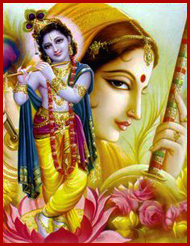 I fell under Mirabai’s spell in Manhattan, when a western friend who had just returned from India handed me a slim book about her extraordinary life. At the time I was still struggling to make sense of what appeared to be a chaotic, violent and apparently loveless world in which I could see no sign of what the citadels of monotheism called “the moving finger of God”. If such an entity existed, I decided in a fit of pique, he’d made a royal mess of things.
I fell under Mirabai’s spell in Manhattan, when a western friend who had just returned from India handed me a slim book about her extraordinary life. At the time I was still struggling to make sense of what appeared to be a chaotic, violent and apparently loveless world in which I could see no sign of what the citadels of monotheism called “the moving finger of God”. If such an entity existed, I decided in a fit of pique, he’d made a royal mess of things.
Absorbing Mira’s amazing story, I found the courage to go deeper within myself. Now here was a rebel I could identify with, an Indian female who had fought with infinite grace to become light, joyous and free—that too in a distant era when Hindu women were most often forced into claustrophobic prisons constructed by outdated custom and patriarchal mores.
When I read the version of her life that described how Mira had courageously refused to obey her father-in-law’s order that she leap on to her husband’s funeral pyre, I was exultant—now this was my idea of a heroic Indian woman! Not only had she stood up to her royal father-in-law—a terrible sin in those archaic times—but she had won!
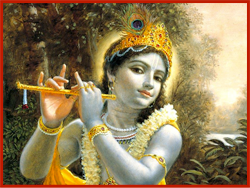 Another vivid image from Mira’s incredible life polished my own view of Absolute and Relative Realities, an eastern concept that had turned my own vision inward. In essence, the Absolute is our true nature—immortal and blissful; the Relative is our finite form, the divine clothed in flesh. The task of the committed seeker is to break through the prison of personal identity and into cosmic consciousness, into the pure knowing that we are all One. Mira’s guru explained this to her in a simple way that I instantly resonated with. Here is his metaphor, which I call Cracking the Matka, in my own words:
Another vivid image from Mira’s incredible life polished my own view of Absolute and Relative Realities, an eastern concept that had turned my own vision inward. In essence, the Absolute is our true nature—immortal and blissful; the Relative is our finite form, the divine clothed in flesh. The task of the committed seeker is to break through the prison of personal identity and into cosmic consciousness, into the pure knowing that we are all One. Mira’s guru explained this to her in a simple way that I instantly resonated with. Here is his metaphor, which I call Cracking the Matka, in my own words:
A matka is a clay pot used by village women in India mainly for cooking and carrying water. If you take a matka to the river to fill it, and it happens to strike a sharp rock and cracks when it is brimful of water, the water within the pot and the river water will merge and become instantly indistinguishable. And so it is at the moment of enlightenment, when all the doors of consciousness open and the individual seeker merges with the Divine!
Many great souls have inspired me to follow my own razor’s edge walk to liberation; among those who have been my guiding lights, Mirabai shines like a great diamond. So let me end my own paean of praise to this distant spiritual sister with one of her own moving odes to Krishna, the perennial lover who never abandoned her, unlike the mortals around her, many of whom wished to see her burned to cinders for daring to defy their social norms.
 The dagger of love has pierced my heart
The dagger of love has pierced my heart
I was going to the river to fetch water,
A golden pitcher on my head.
Hariji has bound me
By the thin thread of love,
And wherever He draws me,
Thither I go.
Mira’s Lord is the courtly Giridhara:
This is the nature
Of his dark and beautiful form.
Follow Blog via Email
Enter your email address to follow this blog and receive notifications of new posts by email.
Click the buttons below to SHARE if you liked this post.


July 11, 2014
Mirabai’s Dazzling Cosmic Vision…2 of 3
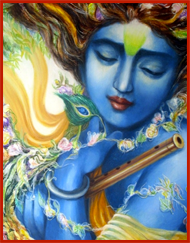 Mira saw her entrancing Blue God everywhere—in rocks, forests and blossoms, in storm, thunder and lightning, in animate and inanimate things. Fearless and ascetic, graceful and elegant, Mira was saint, philosopher, singer and poet, and one of India’s most versatile geniuses.
Mira saw her entrancing Blue God everywhere—in rocks, forests and blossoms, in storm, thunder and lightning, in animate and inanimate things. Fearless and ascetic, graceful and elegant, Mira was saint, philosopher, singer and poet, and one of India’s most versatile geniuses.
Uncaring of her critics, Mira danced wildly on the streets of Vrindavan. Averse to the ritualistic worship so entrenched in the Indian psyche, she focused on Krishna—who was husband, friend, family and Guru to her. Shielded by his love, she forsook royal extravagance for a beggar’s life on the bustling streets of ancient Vrindavan. Wars erupted around her, and human consciousness sank to its nadir, yet nothing could stop this Queen from her simple devotions.
This is why, centuries after her miraculous passing, her poem-songs continue to infuse people with courage and unconditional love of the Divine; they express both her yearning to merge with Krishna, as well as the ecstasy of divine union. Her songs melt the angry wounded human heart into surrender; they inspire not because she was a skilled wordsmith, but because they were tender outpourings of a heart dedicated to the Divine. Even atheists have been profoundly moved by Mira’s potent language of love.
Mine Is Gopal
Mine is Gopal, the Mountain-Holder; there is no one else.
On his head he wears the peacock-crown: He alone is my husband.
Father, mother, brother, relative: I have none to call my own.
I’ve forsaken both God, and the family’s honor: what should I do?
I’ve sat near the holy ones, and I’ve lost shame before the people.
I’ve torn my scarf into shreds; I’m all wrapped up in a blanket.
I took off my finery of pearls and coral, and strung a garland of wildwood flowers.
With my tears, I watered the creeper of love that I planted;
Now the creeper has grown spread all over, and borne the fruit of bliss.
The churner of the milk churned with great love.
When I took out the butter, no need to drink any buttermilk.
I came for the sake of love-devotion; seeing the world, I wept.
Mira is the maidservant of the Mountain-Holder:
Now with love He takes me across to the further shore.
I danced before my Giridhara
Again and again I dance
To please that discerning critic,
And put His former love to the test.
I put on the anklets
Of the love of Shyam,
And behold! My Mohan stays true.
Worldly shame and family custom
I have cast to the winds.
I do not forget the beauty of the Beloved
Even for an instant.
Mira is dyed deeply in the dye of Hari.
This infamy, O my Prince
Is delicious!
Some revile me,
others applaud,
I simply follow my incomprehensible road
A razor thin path
but you meet some good people,
A terrible path but you hear a true word
Turn back?
Because the wretched stare and see nothing?
O Mira’s Lord is noble and dark,
and slanderers
rake only themselves
over the coals
I am mad with love
And no one understands my plight.
Only the wounded
Understand the agonies of the wounded,
When the fire rages in the heart.
Only the jeweler knows the value of the jewel,
Not the one who lets it go.
In pain I wander from door to door,
But could not find a doctor.
Says Mira: Harken, my Master,
Mira’s pain will subside
When Shyam comes as the doctor.
That dark Dweller in Braj
Is my only refuge.
O my companion,
Worldly comfort is an illusion,
As soon you get it, it goes.
I have chosen the Indestructible for my refuge,
Him whom the snake of death
Will not devour.
My Beloved dwells in my heart,
I have actually seen that Abode of Joy.
Mira’s Lord is Hari, the Indestructible.
My Lord, I have taken refuge with Thee,
Thy slave.
Unbreakable, O Lord
Is the Love
That binds me to You:
Like a diamond
It breaks the hammer that strikes it.
As the polish goes into the gold.
As the lotus lives in its water,
I live in You.
Like the bird
That gazes all night
At the passing moon,
I have lost myself dwelling in You.
O my Beloved Return.
Just for the asking.
Birth in a human body
Is the reward for good deeds
In former births.
Life waxes and wanes imperceptibly,
It does not stay long.
The leaf that has once fallen
Does not return to the branch.
Behold the Ocean of Transmigration.
With its swift, irresistible tide.
O Lal Giridhara, O pilot of my soul,
Swiftly conduct my barque to the further shore.
Mira is the slave of Lal Giridhara.
She says: Life lasts but a few days only.
Follow Blog via Email
Enter your email address to follow this blog and receive notifications of new posts by email.
Click the buttons below to SHARE if you liked this post.


July 10, 2014
And Mirabai Sang the Blues…1 of 3
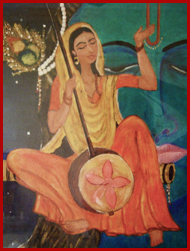 Six hundred years or so ago in the fabled land of Rajasthan, Home of Kings, Princess Mira blossomed under the benevolent guidance of her grandfather. Many versions of her amazing life in 14th century India abound; this particular retelling is not to please the historian or the scholar, for I am neither, but merely to give you a sweet taste of the soul of an exceptional female who transformed both her inner and outer worlds.
Six hundred years or so ago in the fabled land of Rajasthan, Home of Kings, Princess Mira blossomed under the benevolent guidance of her grandfather. Many versions of her amazing life in 14th century India abound; this particular retelling is not to please the historian or the scholar, for I am neither, but merely to give you a sweet taste of the soul of an exceptional female who transformed both her inner and outer worlds.
Mira was exquisitely lovely, talented and intelligent; her life was a sparkling tapestry of everything a young royal could dream of. Aware of her unusual potential, her grandfather encouraged Mira to immerse herself not just in the scriptures and in the art of making superb music, but also to acquire the skills of archery, fencing, horseback-riding and chariot-driving, for that was a time of frequent war.
At fourteen, Mira was persuaded to marry Rana Kumbha of Mewar, who adored Mira not just for her beauty but for her passionate love of god. Mira could well have lived out her life as just another of India’s pampered royals; instead her unflinching passion for the Blue God in the face of the hostility she faced from her in-laws—for refusing to abandon Krishna for the family deity Goddess Durga, for befriending holy men, and for proclaiming the Blue God as her true husband—gradually metamorphosed her into a mighty exponent of Prema Bhakti (Divine Love). Today, six centuries after her death, Mirabai is famed as an inspired poet-saint whose tender odes to Krishna have endeared her for all time to the Indian masses.
Why Krishna? Devotees see Krishna as an omnipotent divine being who incarnates on earth from time to time and in infinite forms to restore righteousness. Spectacularly beautiful and charismatic, Krishna is hued the colour of a blue lotus, or a blue cloud—for blue signifies transcendence. It is said that when Mira was little, she saw a wedding procession and asked her mother who she would marry; her mother laughingly said, oh, your bridegroom will be Lord Krishna himself.
Mira took these words to heart and begged a travelling mendicant to give her his precious statue of Lord Krishna. (Some say this mendicant was Raidas, a disciple of Kabir and a low-caste cobbler who, in the caste-ridden ethos of 14th century India, boldly stated that it is not birth but one’s karma that decides one’s fate.) Little Mira was entranced by this statue: She spent most of her time worshiping it as if it were real, dancing, singing, chatting, and even sleeping with her beloved Blue God.
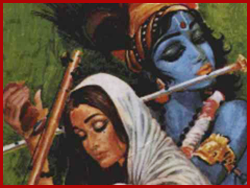 The Blue God was now her husband, and Mira was reluctant to marry a mere mortal. Still she obeyed her beloved grandfather when he ordered her to marry the Rana of Mewar. In the sumptuous palace of her in-laws, however, Mira refused to swerve from her adoration of Krishna. Infuriated, her in-laws tormented her and spread scandalous make-believe tales about her love affairs in order to cause havoc in her husband’s mind.
The Blue God was now her husband, and Mira was reluctant to marry a mere mortal. Still she obeyed her beloved grandfather when he ordered her to marry the Rana of Mewar. In the sumptuous palace of her in-laws, however, Mira refused to swerve from her adoration of Krishna. Infuriated, her in-laws tormented her and spread scandalous make-believe tales about her love affairs in order to cause havoc in her husband’s mind.
In sorrow, Mira wrote to the saint Tulsidas: My in-laws won’t allow me to worship my Krishna, she complained. And yet I cannot break my bond with Him. Tulsidas was direct with her: Abandon those who cannot understand your passion for god, even if they are your dearest relatives! Many saints have done so and their lives were all the happier. Our union with God alone is true and eternal; all other relationships are unreal and temporary. Mira took solace in his words and carried on with her devotions.
News of her delightful paeans of praise to Krishna wafted across northern India and into the ear of the mighty Mughal Emperor Akbar, who yearned to hear the lovely Mira. Now the Rajputs and the Muslims were arch enemies—for Akbar to sit among her audience could incite the proud Rajputs to war. Undeterred, the Emperor traveled to Chitore in disguise with his court musician Tansen and entered the temple to hear her sing. So profoundly moved was Akbar by Mira’s radiance that he touched her feet and placed a necklace of priceless gems in front of the idol of Krishna.
Word somehow got to Mira’s husband about the Emperor’s visit; in a fury, the Rana ordered Mira to drown herself for bringing disgrace to his noble clan. Mira proceeded to the river, singing and dancing in ecstasy all along the way. Then an arm encircled her waist. She swung around to see her beloved Blue God and fainted with ecstasy. When she opened her eyes, Krishna was still with her. My beloved Mira, he whispered into her ear, your life with your mortal relatives is over. You are absolutely free. You are and have always been mine. Leave now for Vrindavan.
Mirabai walked barefoot on the hot sandy beds of Rajasthan all the way to Vrindavan, the holy city associated with Krishna’s early life, when he lived with the Gopis or milkmaids. At Vrindavan, she reunited with her guru Raidas. Drawn by her luminosity, people flocked to hear her sing and dance; one of these devotees was no other than her repentant husband, garbed as a mendicant; revealing his identity, the Rana begged Mirabai to forgive him and asked her to return to Mewar as his Queen. Mira must have blown him away with her response. “What is lineage, heritage or inheritance?” she inquired. “What is the meaning of this ridiculous caste system? Who is man and who is woman? I am no more Queen than you are King! Only one King exists for me and my life belongs entirely to him!”
Overcome by the force of her divine love, the Rana prostrated before her and left Vrindavan, a changed man. As for Mira, her fame continued to spread; and yet, when later her husband begged her once again to return to Mewar and promised she could live in the temple of Krishna and do as she pleased, Mira agreed.
Mira’s travels were far from over…from Mewar she returned to Vrindavan, then traveled onward to Dwaraka, accompanied this time by the devoted Rana. In Dwaraka, her husband once again invited Mira to return to Mewar; reluctant to leave her Krishna, Mira asked permission to spend the night at the Temple of Ranchhorji. Next morning her lifeless body was found lying at Krishna’s feet; her devotees believe that sometime during the night, her spirit fused with her beloved Blue God.
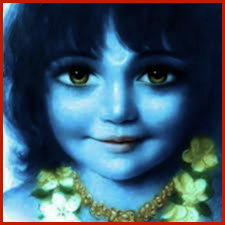 Another version of Mira’s life claims she refused to return to Mewar with the Rana. Returning to his kingdom alone, her husband was forced into battle with the Mughals and died of his resulting wounds. Now that Mira had no royal male to protect her, her father-in-law attacked her viciously, ordering her to voluntarily throw herself on to her husband’s funeral pyre. (Suttee is the practice of so-called “voluntary suicide” customary among Rajput women upon the death of a husband.) “My lord and master is Krishna!” Mira asserted fiercely, once again challenging the rigid Rajput patriarchy. “My real husband is immortal!” And no matter how hard her in-laws urged her to do the righteous thing and burn, baby, burn, Mirabai stuck to her guns, refusing to be reduced to cinders in this most humiliating and brutal of ways. She wanted to stay alive to sing her songs of praise to the Blue God—and who but Krishna could stop her?
Another version of Mira’s life claims she refused to return to Mewar with the Rana. Returning to his kingdom alone, her husband was forced into battle with the Mughals and died of his resulting wounds. Now that Mira had no royal male to protect her, her father-in-law attacked her viciously, ordering her to voluntarily throw herself on to her husband’s funeral pyre. (Suttee is the practice of so-called “voluntary suicide” customary among Rajput women upon the death of a husband.) “My lord and master is Krishna!” Mira asserted fiercely, once again challenging the rigid Rajput patriarchy. “My real husband is immortal!” And no matter how hard her in-laws urged her to do the righteous thing and burn, baby, burn, Mirabai stuck to her guns, refusing to be reduced to cinders in this most humiliating and brutal of ways. She wanted to stay alive to sing her songs of praise to the Blue God—and who but Krishna could stop her?
Follow Blog via Email
Enter your email address to follow this blog and receive notifications of new posts by email.
Click the buttons below to SHARE if you liked this post.


July 5, 2014
“How Wolves Change Rivers”
June 29, 2014
…hail, Fellow Scribblers and Bloggers… well met, even if it’s only virtual, I salute yeez all… #TBSU…
Reblogging this neat post because I too tenderly collect friends on the internet…which all self-published authors must do – or die! As Chris says here, quality better than quantity…i get to know and love my cyber-pals…
 Originally posted on Seumas Gallacher:
Originally posted on Seumas Gallacher:
…through the centuries, various discoveries and inventions have massively impacted and revolutionised Mankind and Mankind’s behaviour… the wheel… writing… medicines… flying machines… guns… telephones… radio… television… electricity… and I’m sure yeez can think of dozens more examples… in the last half-generation, one of the major transformational elements has been the internet… this ol’ Jurassic almost missed out on the phenomenon of the Web entirely, if not for the accident of falling under the attraction of evolving into a self-publishing quill-scraper… part of the continual ‘business’practice of being a modern scribe, is the need to be ‘present and counted’ on the SOSYAL NETWURKS… and that involves communicating with others on here… for some misguided (in my ‘umble opinion) souls, that equates to gathering as many ‘contacts’ as they can… yeez will see from time to time a proliferation of scamsters offering to ‘sell’ yeez gazillions of ‘followers’(
View original 226 more words


June 17, 2014
Reflections on Life’s Path
Michael Lewin’s excellent advice for living a simple and profound life –as opposed to trying (frantically) to keep up with an insane world…thanks Michael, and may your tribe swell into the gazillions…
 Originally posted on Michael Lewin:
Originally posted on Michael Lewin:
Go deep into life; make it a binding commitment. To live on the surface of things, to seek pleasure in only superficial satisfactions, that quickly evaporate, is a denial of your real self, the deeper self that knows of richer things.
Real empowerment often comes through the grace of giving way, letting go of the will that forces and controls. We are not fully in charge of our lives because they are situated in a bigger, more complex dynamic called life. And once we acknowledge this reality; place our faith in its power to guide and lead us then we will undoubtedly be brought to new horizons.
In our fast paced world we all need to cultivate more patience – the ability to sit with the rhythms of life rather than impose our speeded up version. This more relaxed mode of being will then pay enormous dividends in…
View original 607 more words


June 11, 2014
WHY PROOFREADING IS SEXY
Excellent article for those of us who love the power and magic of words…Julia Bohanna focuses on English, but I think her points apply to any language…so thank you Julia, and Chris Graham (for being a conduit to this piece).
 Originally posted on the inflectionist:
Originally posted on the inflectionist:
WHY PROOFREADING IS SEXY
DEPENDING ON YOUR (BUT NOT YOU’RE) PERSPECTIVE
By Julia Bohanna: Columnist
We appear to be an increasingly illiterate nation, if all the poor spelling outside many businesses is an accurate representation of our lack of respect for language. What on earth does ‘Todays Special’s’ mean on a chalk board anyway? How many times must I see a list that mentions ‘Carrot’s’? I am waiting to see what these carrots possess – what they will bring to the party other than orangeness, crunch and mystic whiskeriness at their tips? Apostrophe abuse is alive and on every street, in every shop window. Even in schools, including letters that come home to parents.
 I hasten to add that I am not intent on belittling people who have genuine dyslexia. Or people for whom English is not their first language. Or even those with catastrophic brain…
I hasten to add that I am not intent on belittling people who have genuine dyslexia. Or people for whom English is not their first language. Or even those with catastrophic brain…
View original 898 more words


June 7, 2014
The Ego is Not Your Amigo – Part 2 of 2
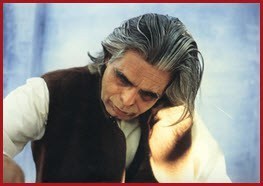
Harish Johari
I first began to consciously pursue the destruction of my own troublesome ego when I lived in hectic Manhattan. At the time, I had just begun to plot a novel based on eastern philosophy (Whip of the Wild God: A Novel of Tantra in Ancient India), and was engrossed in learning everything I could about Tantra and mysticism.
In the process, I met folks who tended to interpret Tantra mainly as a license to enjoy indiscriminate sex. My view was different: mainly from delving into the treasure trove of eastern philosophy at the New York Public Library, I had discovered that, etymologically speaking, the word Tantra derives from two Sanskrit words: tanoti and trayati—meaning: the explosion of consciousness. How one performs this magic is up to the individual; while couple-hood can certainly become a means of liberation, celibate tantrics often evolve faster—simply because they are relieved of having to cope with the eccentricities of an ego-driven partner.
Sometime during those exciting years, I flew from Manhattan to Vermont for a weekend workshop with Harish Johari—a master tantrik and artist gifted with a multitude of talents. Early one morning, I had the good fortune to walk through the verdant fields surrounding our retreat home in his company. Taking advantage of the situation, I asked him for advice about a painful situation in which I was enmeshed. This is more or less what he said: Mira, I will give you a single job—do it well, and I guarantee it will lead you to lasting peace and happiness.” My ears pricked up. “Constantly observe your ego,” he advised.“It has billions of masks and is a genius of deception. Watching it is enough! The ego cannot bear to have its antics witnessed. Slowly it will stop playing its spellbinding games—and you will experience yourself as the immortal Self—as existence-consciousness and bliss.
I did not meet Harish Johari again. Years later he passed away, leaving behind a stunning legacy of fantastic eastern divine art and much else. When I heard of his death, the thought flashed that a whole journey can begin when a guru has the guts and the wisdom to say just the right thing to a seeker—not from his or her own ego, but from the plane of divine consciousness.
Harish’s advice burned itself into my hungry heart—even as life hammered relentlessly away at my monstrous ego. Despite the pain intense self-analysis evoked, I persisted in locating that false sense of self that I now knew lay at the root of all my suffering. Why did I take on this immense and subtle chore? Because I had come to understand that when one finally discovers that the ego is not “real”—meaning it is not a permanent entity, but rather a haphazard conglomeration of gazillions of labels plastered onto a false self over countless lives—one simultaneously realizes that there is no concrete “person” to be hurt or attacked or even celebrated. And when this gnosis sinks in deep—a process that could take eons—one no longer reacts with the ego to anything the world might hurl at you—whether good, bad or indifferent.
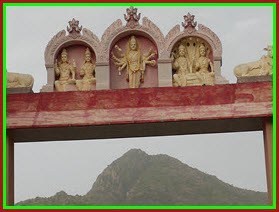
Temple Arch View of the Holy Hill
Significant chunks of time have slipped past since Harish and I traversed those rustling green fields in rural Vermont. And yet my inner work goes on—currently via the ancient practice of Atma-Vichara, investigating the true Self that we all are—blissful, immortal, loving, wise and connected to all beings—and not the desirous, greedy and defensive “mini-me” that most of us spend entire lives trying to shield and protect—a futile task, because no matter how big you grow in the eyes of an ephemeral world, one day this “person” that you think you are must dissolve back into the elements, and the Self that has quietly animated you all along will have remained undiscovered.
Now here’s my version of an intriguing Buddhist tale about a rich Tibetan widow who decided to seek enlightenment: Trekking all the way up a holy mountain, she begged the wise woman who lived on its peak for help in achieving her desire. The crone asked the widow just how serious she was, and the widow fell at her feet, earnestly assuring her that she was totally committed—whereupon the kindly old woman mutated into a horrible-looking witch with an ugly thorny switch in her hand and chased the rich widow down the mountainside, shrieking: then begin now, begin now, begin now!
Follow Blog via Email
Enter your email address to follow this blog and receive notifications of new posts by email.
Click the buttons below to SHARE if you liked this post.





